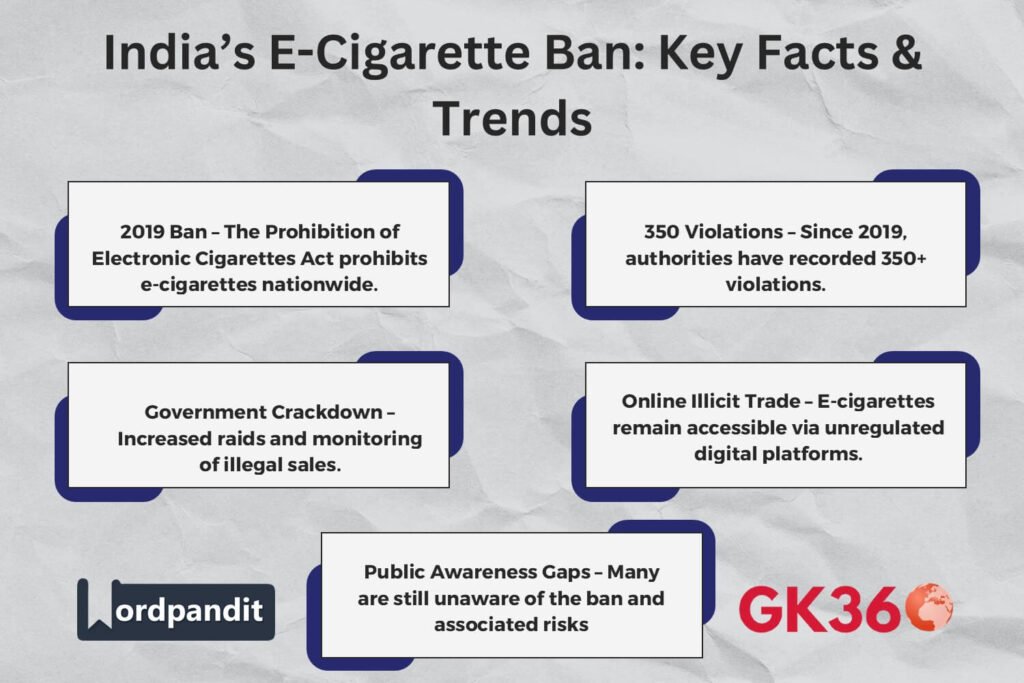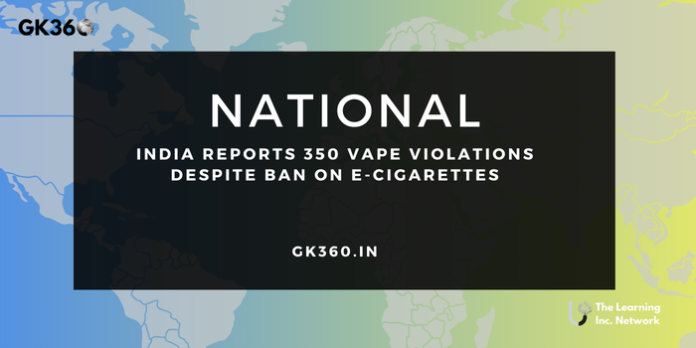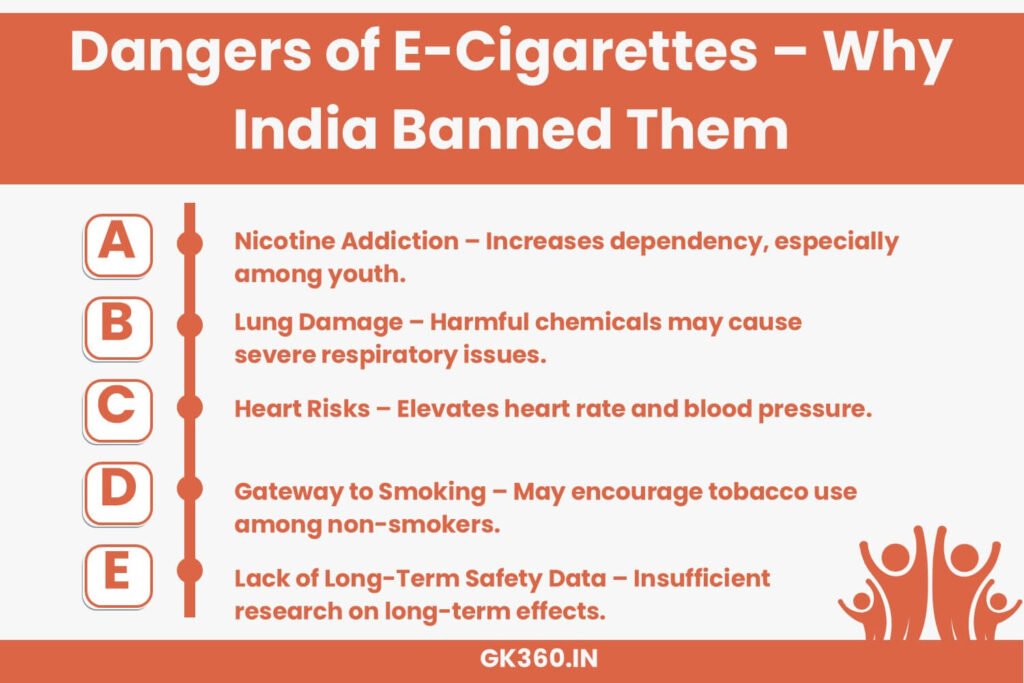E-Cigarette Ban in India: 350 Violations Reported Since 2019 – Trends & Legal Insights
Introduction: The Rising Challenge of E-Cigarette Violations in India
Since the implementation of the Prohibition of Electronic Cigarettes Act, 2019, India has witnessed 350 violations related to e-cigarette use and distribution. Despite the ban, reports indicate increasing non-compliance, highlighting challenges in enforcement and public adherence to regulations. As authorities strengthen monitoring, understanding the trends, risks, and legal implications of vaping in India becomes crucial.

Table of Contents
- Understanding E-Cigarettes and Their Health Risks
- Violation Trends and Government Response
- India’s Legislative Framework: A Global Comparison
- Key Challenges in Enforcing the E-Cigarette Ban
- FAQs: Your Questions About India’s Vaping Laws Answered
- Conclusion & Call-to-Action
1. Understanding E-Cigarettes and Their Health Risks
What Are E-Cigarettes?
E-cigarettes, also known as Electronic Nicotine Delivery Systems (ENDS), are battery-powered devices that heat a liquid containing nicotine, producing an aerosol that users inhale.
Health Risks of Vaping
- Nicotine Addiction: Highly addictive and harmful, especially to adolescents.
- Cardiovascular Risks: Increases heart rate and blood pressure, leading to long-term health complications.
- Respiratory Issues: Contains harmful chemicals that may cause lung damage.
- Gateway to Smoking: May encourage traditional tobacco use, particularly among youth.
2. Violation Trends and Government Response
Reported Violations by Year:
- FY24: 263 violations
- FY23: 33 violations
- FY22: 48 violations
- FY21: No reported cases
Despite strict bans on manufacturing, import, sale, distribution, and advertising, enforcement remains a challenge. The Ministry of Health and Family Welfare is intensifying crackdowns, yet reports indicate illegal sales through online platforms and unregulated vendors.
3. India’s Legislative Framework: A Global Comparison
Prohibition of Electronic Cigarettes Act, 2019
This law comprehensively bans e-cigarettes, aiming to protect public health and prevent nicotine addiction. Violators face penalties, including fines and imprisonment.
How India Compares Globally
India’s ban aligns with 30+ countries, including:
- Australia, Singapore, Thailand, and Saudi Arabia — Strict prohibitions due to health concerns.
- United States & UK — Allow regulated sales but with age restrictions and health warnings.
- China — Major manufacturer but has recently imposed restrictions.
4. Key Challenges in Enforcing the E-Cigarette Ban
- Online Sales & Illicit Trade: E-cigarettes are still accessible via illegal online markets.
- Lack of Public Awareness: Many consumers are unaware of the ban and its health risks.
- Enforcement Limitations: Authorities face difficulty in monitoring and curbing underground sales.
- Youth Appeal: Flavored vapes continue to attract adolescents, making regulation challenging.
5. FAQs: Your Questions About India’s Vaping Laws Answered
1. Is vaping completely illegal in India?
Yes, the Prohibition of Electronic Cigarettes Act, 2019 bans manufacturing, sale, import, and distribution of all e-cigarettes.
2. What happens if someone is caught selling e-cigarettes?
Violators face penalties, including imprisonment up to 1 year and fines of up to INR 1 lakh for first-time offenses. Repeat offenders face harsher penalties.
3. Can I bring e-cigarettes into India from another country?
No, importing e-cigarettes is illegal, even for personal use.
4. Why are e-cigarettes banned while traditional cigarettes are still legal?
India regulates traditional tobacco under COTPA, 2003, but the government banned e-cigarettes due to their rapid rise in youth consumption and the lack of long-term safety data.
5. How is India ensuring compliance with the ban?
Authorities conduct raids, awareness campaigns, and digital monitoring to curb illegal sales.
6. Conclusion & Call-to-Action
The 350 violations since the e-cigarette ban highlight the ongoing struggle between regulation and public compliance. As enforcement tightens, public awareness remains key in curbing illegal sales and vaping-related health risks.
Key Takeaways
| Aspect | Details |
|---|---|
| E-Cigarette Ban Implementation | India banned e-cigarettes under the Prohibition of Electronic Cigarettes Act, 2019. |
| Number of Violations | Over 350 cases reported since the ban, with rising numbers in FY24. |
| Government Response | Increased enforcement, including raids and monitoring of illegal sales. |
| Major Enforcement Challenges | Online sales, lack of awareness, and youth-targeted marketing of illicit vapes. |
| Health Risks | Nicotine addiction, lung and heart damage, and unknown long-term effects. |
| Legal Penalties | First-time violators face up to 1 year in prison and ₹1 lakh fine. Repeat offenses incur harsher punishments. |
| Comparison with Other Countries | India joins 30+ nations like Australia, Thailand, and Singapore in banning e-cigarettes, while the US and UK regulate them with restrictions. |
Related Terms:
- E-cigarette ban India
- Vaping laws India 2024
- E-cigarette violations in India
- Health risks of vaping
- Illegal e-cigarette sales
- India’s vaping law enforcement
- Nicotine addiction effects
- Prohibition of Electronic Cigarettes Act
- Government crackdown on vaping
- Youth vaping dangers






